One of the hurdles of HIV vaccine design is developing a vaccine capable of inducing cross-reactive broadly neutralising antibodies (Ab) that can neutralise the large diversity of HIV envelope (env) proteins. Understanding immune responses in individuals who have HIV superinfections* could be the key to understanding how the immune system responds to sequential exposure to two distinct HIV env antigens. Results from such studies can inform the design of future heterologous prime-boost HIV vaccine strategies. HIV superinfection could either induce Ab responses that have an additive effect (induction of two or more HIV strain specific-Ab responses) or synergistic effect (promotion of cross-neutralising Ab (nAb) to epitopes conserved in both viral strains.
Study conducted by Sheward et al., assessed immune responses from a longitudinal (2 years) cohort of women (108) whom had acute/early HIV infection. This study design enabled researchers to identify and isolate founder (primary) and secondary infecting virus prior to viral recombination. Of the 108 women in the cohort, 5 (results based on 4) women became superinfected during the follow up period. They hypothesised that memory responses after HIV superinfection would (1) be higher than primary responses, (2) be induced quicker than primary responses and (3) neutralise both primary and secondary infecting virus.
They observed no difference in the induction kinetics of primary and secondary HIV strain immune responses, where neutralising Ab responses were detectable 9-17 weeks after HIV infection in both cases. Additionally, HIV superinfection did not boost nAb responses to the initial infection, elicit Ab responses to conserved epitopes nor expand Ab breadth. Overall researchers primarily observed an additive effect, where non-cross reactive Ab responses were detected to both primary and secondary infecting HIV strains.
In summary, Sheward et al., demonstrated that HIV superinfection did not improve primary memory responses but rather induced potent de novo immune responses that resulted in an additive nAb effect.
*HIV superinfection: Infection with a second HIV strain after an established primary HIV infection.
Journal Article: Sheward et al., 2018. HIV Superinfection Drives De Novo Antibody Responses and Not Neutralization Breadth. Cell Cost & Microbe
Article by Cheleka AM Mpande











